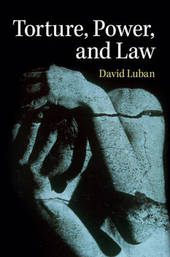
|
Torture, Power, and Law
Hardback
Main Details
| Title |
Torture, Power, and Law
|
| Authors and Contributors |
By (author) David Luban
|
| Physical Properties |
| Format:Hardback | | Pages:320 | | Dimensions(mm): Height 235,Width 156 |
|
| ISBN/Barcode |
9781107051096
|
| Classifications | Dewey:399 |
|---|
| Audience | | Professional & Vocational | |
|---|
|
Publishing Details |
| Publisher |
Cambridge University Press
|
| Imprint |
Cambridge University Press
|
| Publication Date |
4 September 2014 |
| Publication Country |
United Kingdom
|
Description
This volume brings together the most important writing on torture and the 'war on terror by one of the leading US voices in the torture debate. Philosopher and legal ethicist David Luban reflects on this contentious topic in a powerful sequence of essays including two new and previously unpublished pieces. He analyzes the trade-offs between security and human rights, as well as the connection between torture, humiliation, and human dignity, the fallacy of using ticking bomb scenarios in debates about torture, and the ethics of government lawyers. The book develops an illuminating and novel conception of torture as the use of pain and suffering to communicate absolute dominance over the victim. Factually stimulating and legally informed, this volume provides the clearest analysis to date of the torture debate. It brings the story up to date by discussing the Obama administration's failure to hold torturers accountable.
Author Biography
David Luban is University Professor in Law and Philosophy at Georgetown University. His many publications include Lawyers and Justice: An Ethical Study (1988), Legal Modernism (1994), Legal Ethics and Human Dignity (2007), and well-known essays on just war theory and international criminal law.
Reviews'David Luban has written over the past decade an extraordinarily compelling set of philosophical, legal (and simply human) reflections on what has unfortunately become a defining issue - torture. He raises crucial questions not only about the role of lawyers in legitimizing indefensible practices, but also about broader aspects of moral argument, especially the common practice of relying on 'extreme cases' and 'brainteasers' as alternatives to confronting more mundane (and horrific) realities. The book therefore promises to be important even after that happy day when torture has indeed been eliminated from the world.' Sanford Levinson, University of Texas, Austin 'Of all those who have written on themes of justice and power in the aftermath of 9/11, David Luban's work is among the very best. His elegant argumentation and fluid prose effortlessly cross the boundaries between law, philosophy and political theory. Taken together, these essays provide a hugely compelling defence of fundamental rights in the face of those who have sought to weaken longstanding constitutional and moral protections. No one with an interest in society's response to torture or the broader debate on civil liberties can afford to ignore this book.' David Rodin, University of Oxford 'If there is but one book to pick from the shelf dealing with the US political crisis over the use of torture, then clearly it is David Luban's. With a merciless dissection of the semantic games played by Washington lawyers and a brilliant discussion of the key questions of law and ethics at the heart of the torture debate, Luban emerges as the subject's undisputed grand master.' Scott Horton, Columbia Law School 'David Luban's writing has been indispensable in the torture debates. No one has done more than he has to confront the 'ticking bomb' hypothetical. No one has engaged more deeply with our understanding of what torture is than Luban has in his essay on 'the communicative aspect of torture'. These writings represent perhaps the most serious and sensitive work that has emerged from this grim chapter in America's history.' Jeremy Waldron, New York University
|